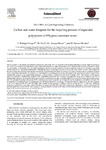Carbon and water footprint for the recycling process of expanded polystyrene (EPS) post-consumer waste

Use this link to cite
http://hdl.handle.net/2183/31070
Except where otherwise noted, this item's license is described as Atribución-NoComercial-SinDerivadas 3.0 España
Collections
- Investigación (FCIE) [1227]
Metadata
Show full item recordTitle
Carbon and water footprint for the recycling process of expanded polystyrene (EPS) post-consumer wasteDate
2022-03-08Citation
J. Hidalgo-Crespo, M. Soto, J.L. Amaya-Rivas, M. Santos-Méndez, Carbon and water footprint for the recycling process of expanded polystyrene (EPS) post-consumer waste, Procedia CIRP. 105 (2022) 452–457. https://doi.org/10.1016/j.procir.2022.02.075.
Abstract
[Abstract] Plastic pollution of the natural environment is ubiquitous, and around 40% of all plastic waste produced globally is used in single-use products and only 9% is recycled. From this plastic waste, expandable polystyrene single-use products pose a major problem because of its great volume and low density. To abord this issue, the authors proposed a circular economy model for EPS post-consumer waste in 2019 through a case study with the help of one local plastic manufacturer. Although the idea of promoting circularity of this waste seems a priori to have a good impact on the environment, the process to reincorporate reused and/or recycled materials under the concept of CE have economic and environmental impacts on the environment that should be measured. To understand if a recycling process is truly beneficial to the environment, first we need to do a sustainability analysis, using sustainability indicators, such as Carbon Footprint (CF) and Water Footprint (WF). The objective of the present paper is to perform a sustainability analysis of the expandable polystyrene post-consumer recycling into resin pellets using CF and WF as sustainability indicators. We proposed three case scenarios considering an artisanal recycling with 2019 (A), and 2027 proposed electricity power mix (B), industrial recycling with current 2019 electricity power mix (C) and the use of virgin PS and its destination in landfill to compare. We measured the CO2 emissions and m3 of freshwater with the help of SimaPro 9.1 software. Overall, the total CO2 emissions for the case scenarios A and B are approximately 42% and 16% higher than scenario D, but scenario C exhibits a reduction of almost 50%. For the water depletion, scenarios A and B show very higher values than those of scenario D with 536% and 534%, respectively. Important to mention that scenario B presents much better values for CF than scenario A, meaning that the increase in the share of electricity production by renewable energies can improve the sustainable production of recycled PS resin.
Keywords
Circular economy
EPS
Post-Consumer
Waste
Carbon footprint
Water footprint
EPS
Post-Consumer
Waste
Carbon footprint
Water footprint
Editor version
Rights
Atribución-NoComercial-SinDerivadas 3.0 España
ISSN
2212-8271






